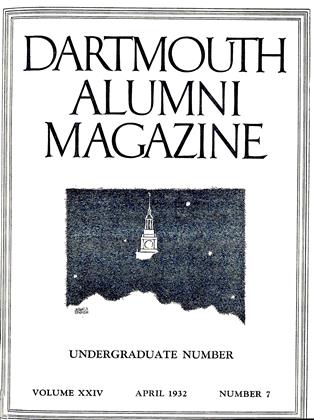THE greater part of the present undergraduate body of the College was between four and five years old at the outbreak of the war. This means that they dimly remember the bands and the peach pits and the Victory Loans and the bewildering hysteria of Armistice Day when for some reason or other they were let out of school and allowed to march in a parade and to go to the movies free.
Today these four-year-olds have grown and now stand to be called among the first in the event of another, war. Apparently there is nothing remarkable in this natural process of growing up, with its consequent attainment of citizens' rights and obligations. Actually there is an unusual factor that enters into any consideration of their civic responsibilities in general and their war eligibility in particular. These men are extraordinary because they were too young to appreciate the seriousness of the war while it was in progress and because since the Armistice they have been subjected to a continuous round of anti-war propaganda in the form of novels, pamphlets, editorials, lectures and sermons.
What has been the net result? If, by some sorry fluke of the fates, the world should again roar up in flames and if this country were sucked into the maelstrom, what would be the reaction of these college men, this frontline fodder?
A nation-wide straw vote on disarmament announced recently by the Intercollegiate Disarmament Council reveals that 92 per cent of the 23,345 students voting in 70 different colleges were in favor of reducing armaments in general and that 63 per cent voted for the United States to set an example by beginning to disarm without waiting for the other nations. Dartmouth participated in this poll and the results were more or less symmetrical with the nation-wide vote. That is to say, that Dartmouth (at least that proportion who voted) is in theory definitely opposed to any policy of armed peace.
There are further facts to be consulted. The grand majority of Dartmouth men voted in a recent poll against the establishment of compulsory military training in colleges. Moreover, one out of every four of those voting had had some form of military training.
So much for dull figures. There is nothing extraordinary about them and little to be deducted from them. There are few natural-born warhawks. And it is a simple thing to renounce war with a pen. It is done quite casually.
But what would be the reaction if war were shrieking its way across the nation? If another Dartmouth Brigade were organized, if men were again fumbling with machine guns in the gym, if the faculty were once more drilling stolidly on the campus, if the hardier souls were skipping across the border to sign up with the Canadians, then what would the feeling be? Would all these novels, all these anti-war societies, these lectures, these editorials be of any avail? It is safe to say that they would not. It is difficult enough to think once in a yelling mob; there are very few who can think twice.
There would undoubtedly be the usual group of dissenters. They would just as undoubtedly be marked down as pariahs. The flags would fly; the bands would play; there would be gaudy publicity. In a minute we would forget all this drab chatter of the novels and the pamphlets.
And we would all be sucked in. Every last one of us.
 View Full Issue
View Full Issue
More From This Issue
-
 Article
ArticleAn Undergraduate Looks at His College
April 1932 By Howland H. Sargeant '32 -
 Article
Article"Wildcatter"—A Play in One Act
April 1932 By James W. Riley '32 -
 Class Notes
Class NotesCLASS OF 1910
April 1932 By Harold P. Hinman -
 Class Notes
Class NotesCLASS OF 1928
April 1932 By Leroy C. Milliken -
 Class Notes
Class NotesCLASS OF 1926
April 1932 By J. Branton Wallace -
 Article
ArticleThe Value of Fraternities to the College
April 1932 By Robert Coltman '32
Article
-
 Article
ArticleAN OPPORTUNITY FOR SERVICE
June 1921 -
 Article
ArticlePhi Beta Kappa Elections
November 1928 -
 Article
ArticleJacobs Memorial Prize
June 1948 -
 Article
ArticleRhodes Scholar
JANUARY 1973 -
 Article
ArticleCHARLES MERRILL HOUGH, A GREAT JURIST
JUNE, 1927 By Judge William N. Cohen '79 -
 Article
ArticleGEORGE TICKNOR AND THE COLLEGE LIBRARY
December, 1908 By Sidney B. Fay


